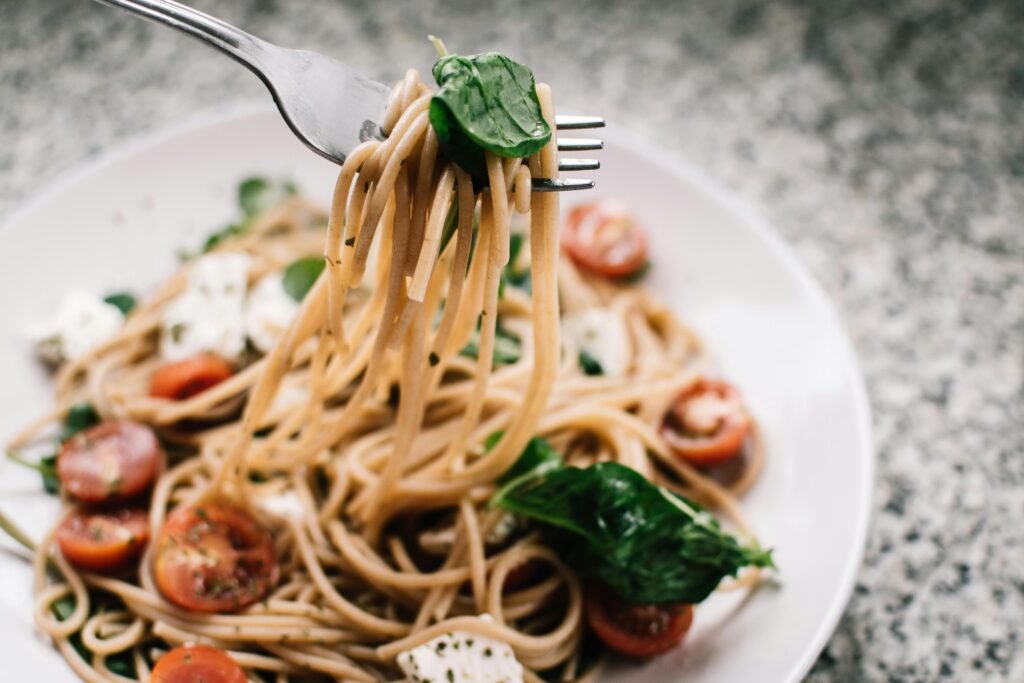How to Improve Digestion with Mindful Eating
Are you wanting improve your digestion, yet you don’t have the money or time to spend on a nutritionist? Or better yet, you’ve hired a nutritionist and the hour phone call at over $100/hour didn’t even cover eating habits. I’ve been there! That’s why I created The Mediocre Cook. My goal of this site is to provide you with the information it took me three years to accumulate. In this article, I will explain one very important thing I have learned, mindful eating! Keep reading to learn what mindful eating is, how it can improve digestion and how to start eating mindfully.
What is Mindful Eating
Before we dive into these three tips, let’s first learn what mindful eating is. Mindful eating is a practice that involves paying full attention to the experience of eating and drinking. It is about being present in the moment and fully engaging with the sensory aspects of food. This approach can have a profound impact on your digestion and overall well-being. Keep reading to learn three tips that you can incorporate today to help improve your digestion through mindful eating.
1. Pause Between Bites
Pausing between bites is something you can easily incorporate to improve digestion. I know you must be thinking that you hardly have the time to eat, much less take breaks while doing it. I know that seems true, but the reality is that it only takes an extra 6 seconds to intentionally pause between bites. In reality, that’s only 1 minute every 10 bites.
I know that we all have places to be and things to do. There aren’t enough hours in a day. But imagine how much time you could actually get back when you improve your digestion. How many times have you spent hours on the toilet or hours focused on how awful you feel instead of being present in life’s moments?
What if mindful eating could actually reduce that in your life? Then, are you really wasting time by doing it or, are you getting more time back because you feel better? Maybe mindful eating could help you show up for all of life’s moments.
Benefits of Pausing Between Bites:
- Helps improve digestion: Taking breaks between bites allows your body to focus on chewing and breaking down food properly, leading to better digestion.
- Increases awareness of hunger and fullness cues: Pausing gives you the opportunity to tune in to your body’s signals. It helps you eat until you’re satisfied, rather than overeating.
- Enhances enjoyment of food: By savoring each bite and taking the time to truly taste your food, you can experience a greater sense of pleasure and satisfaction from your meals.
- Assists in weight management: Pausing between bites can help prevent overeating by giving your brain enough time to register that you’re full, which can contribute to maintaining a healthy weight.
- Reduces digestive discomfort: Eating slowly and pausing between bites can help prevent issues like bloating, gas, and indigestion, allowing you to feel more comfortable after meals.
- Supports mindful eating: Pausing between bites is a key component of mindful eating, which involves paying attention to the taste, texture, and experience of eating. This practice can help you develop a healthier relationship with food and make more intentional choices.
While it may seem like a small change, pausing between bites can have a significant impact on your overall well-being. So, the next time you sit down for a meal, take a moment to slow down, savor each bite, and give yourself the gift of mindful eating to help improve digestion.
2. Eat Meals Within 15 to 40 Minutes
Paying attention to how long it takes you to eat your meals can help improve digestion. This change doesn’t have to happen overnight. Just spend the next week or two timing yourself and try to make changes depending on how long it takes you to eat.
If you’re eating your meals in under 10 minutes, slow down. Give yourself the time to chew your food for longer and take breaks between bites. On the other hand, if it takes you over 45 minutes to eat, try to speed up a bit. Eating too slowly can also have negative effects on digestion.
How Eating Too Fast or Too Slow can Impact Digestion
- Eating Too Fast: When you eat quickly, you tend to swallow more air, which can lead to bloating and discomfort. Additionally, rapid eating doesn’t give your body enough time to signal fullness, often resulting in overeating.
- Eating Too Slow: Eating at an excessively slow pace can cause food to sit in your stomach for longer, leading to feelings of fullness and bloating. It can also make it harder for your body to efficiently break down and absorb nutrients.
By finding a balance and eating your meals within 15 and 40 minutes, you can optimize your digestion and overall well-being.
3. Eat in a Calm and Relaxed Environment
In addition to the time it takes to eat your meals, it’s also important to consider the environment in which you consume your food. Eating in a calm and relaxed setting can further improve digestion. When we eat in a hurry or in a stressful environment, our bodies enter a fight-or-flight response, diverting energy away from digestion and towards other bodily functions.
Creating a peaceful and pleasant atmosphere during mealtime can help activate the parasympathetic nervous system, which is responsible for the rest and digest response. This allows your body to properly break down and absorb nutrients from the food you consume.
How to Create a Calming Mealtime Environment
- Turn off distractions such as the TV or phone if they overstimulate you. Turn on the TV if a distraction from chaos in life is what you need and that helps. I do better with the TV on.
- Set the table with care, using nice dishes and utensils or using dishes and utensils that make you feel comfortable. Similar to choosing what you wear in a day, if it’s a sweatpants day, choose comfort dishes. If it’s a business casual day then maybe break out the nicer dinnerware. I give this example because I always match my outfit with my mood so I like to do the same with the dinnerware I choose.
- Dim the lights or light candles to set a calm mood. At my afternoon snack, I always turn off the overhead light and turn on a lamp to help me rest and digest further. Turning down lights is a great way to relax the body.
- Play soft, soothing music to help relax the mind and body. I don’t personally do this, however I do know it helps some people.
- Mentally tell yourself that the task in front of you is eating. By telling your mind what activity you’re doing, you can easily switch into the mindset for that activity.
- Mentally tell yourself to enter a calm state. By telling your mind you’re calm, you are more likely to feel calm.
- Take a few deep breaths before beginning your meal. This will help to calm your mind and body.
By taking the time to create a peaceful atmosphere and eating your meals mindfully, you can maximize the benefits of your food and support optimal digestion.
Improve your Digestion with Mindful Eating Practice
Practicing mindful eating may take time and effort, but the benefits are well worth it. Not only can it improve your digestion, but it can also help you develop a healthier relationship with food and your body. So, why not give it a try? Start by incorporating some of these mindful eating tips into your daily routine and see how it positively impacts your well-being.
For more articles like this, view all of The Mediocre Cook Healthy Eating Articles.
The information and other content provided in this blog, website or in any linked materials are not intended and should not be considered, or used as a substitute for, medical advice, diagnosis or treatment.




